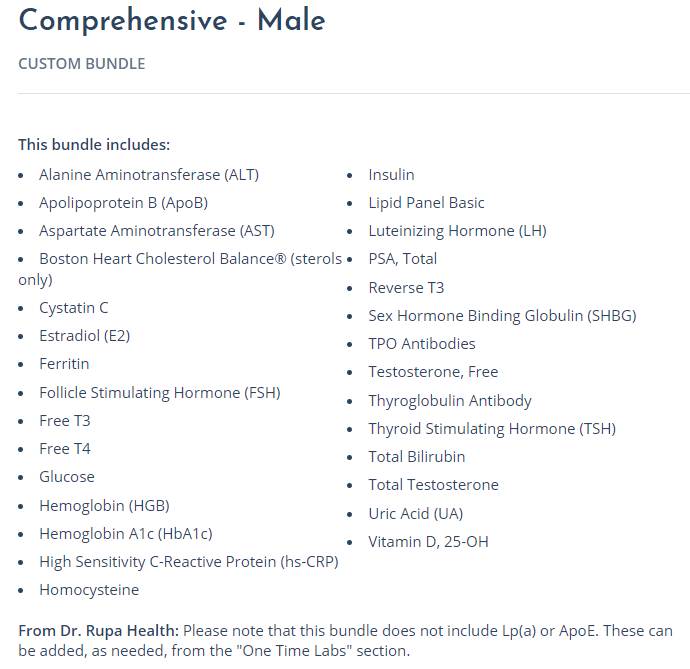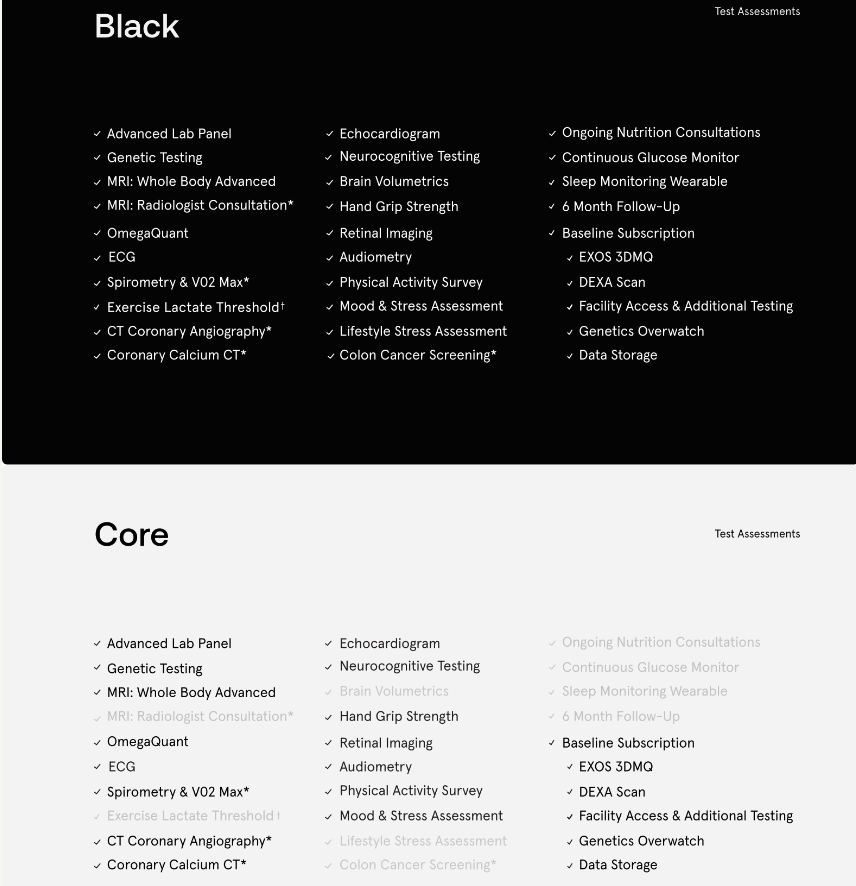I just stumbled upon this list that Troy Delaney has pulled together from what Peter Attia has mentioned in his various podcasts, etc.
Just one more data point for people to consider when they develop their list of personal biomarkers to track (and functional tests also)…
RECOMMENDED LABS, TESTS & METRICS
Markers for Healthspan: Cognitive Scores, Hormone Levels, VO2 Max & Emotional Health Podcast Clip (2:07)
Recommended Labs

Details on the Recommended Labs
Things to Measure One Time:
-
Lp(a) (Lipoprotein A): Phenotype – Peter recommends knowing Mass and Particle number
-
APOE Genotype: Risk for Alzheimer’s/greater risk from head injury. People have a mix of 2, 3, and 4 (one from each parent)
- Having 2 ApoE4 alleles can increase risk of AD (Alzheimer’s Disease) by 10-20x. Peter argues that this is definitely worth checking as you can in fact prevent Alzheimer’s disease
Things to test at least once a year:
- Saúde Cardiovascular
- APOB: APOB is the main protein found in LDL cholesterol. It is the total concentration of LDL and v-LDL which are the big atherogenic particles. Peter thinks a cutoff of less than 90 milligrams per deciliter is good, less than 70, you’re doing great, and less than 50 is pretty optimal and close to perfect. If you want to live to 100, keep it below 30.
- Small LDL-P: Peter wants this to be below 500 nmol/L or ~ 25th percentile (20 mg/dl)
- Trigs: Most responsive to diet changes (lower carbs); reference is < 150 mg/dL (< 1.7 mmol/L) but Peter wants this < 100 mg/dL (< 1.13 mmol/L); trigs should be lower than HDL.
- LDL synthesis: The most preset/not variable
* Better predictive markers than LDL-C (despite C being the more common test)
- VLDL Cholesterol: Non-HDL cholesterol and subtract LDL cholesterol below 15mg/dl
* Endocrinology: Adult and Pediatric (Seventh Edition)
- Total cholesterol is basically useless, HDL is minimally valuable
* Peter likes to see: TG < HDL-C (when measured in mg/dL)
- IGF-1 (Growth Hormone surrogate) – strong driver of cancer; likely that cycling between low and high levels of IGF-1 is optimal;
Fasting can dramatically lower IGF-1
-
OGTT (oral glucose tolerance test): Metabolic health, try to get it with insulin measurements
-
- Goals = Fasting glucose below 90, 1 hour post prandial <130, 2 hour glucose below 100
-
Keto diet people will have very high levels after a challenge (low before), but this isn’t accurate
-
Fasting glucose: Only directionally interesting. This varies a lot during the day, difference from 90 or 105 is more about your cortisol level than metabolic issues
-
Peter uses a Continuous Glucose Monitor (CGM). He doesn’t like the Abbot Freestyle Libre (not accurate enough), has a test version of the Dexcom G6 which is much better. It has a tiny needle, no calibration needed and can connect with your phone
* A month of CGM data is > an OGTT test to Peter
* On CGM, “I like to see my patients with a mean glucose below 100 mg/dL, a glucose variability below 15 mg/dL, and, as noted above, no excursions of glucose above 140 mg/dL.”
-
DEXA: Look at three things: Appendicular lean mass index (ALMI) and fat-free mass index (FFMI). “I [Peter] aim for my ALMI to be in at least the 90th percentile, if not above the 97th percentile as I age. The data are unequivocal: people live longer, better lives with an ALMI above the 75th percentile.”
-
He also looks at:
1. Segmental BMD
2. VAT
3. FMI Total
-
ALT (alanine aminotransferase): Liver health
-
-
< 20 U/L and (reference upper limit: 42-44) and AST 40 but Peter wants patients below 20
-
Best test to see if your liver has issues (side note: ALT elevations are a signal that you should stop taking a new medication – many potential new drugs are stopped if they elevate ALT)
-
Don’t simply accept it if your Dr. tells you your levels are “normal” as those levels have drifted up over time as the average person has gotten less healthy)
-
Fatty Liver/NASH will be the leading driver of liver transplant in the future in US
Honorable mentions: Hcy, hs-CRP, fibrinogen, Lp-PLA2, ADMA, SDMA, Estradiol (E2) – these levels keep going up on average in American men; knowing your family history is important.
Family History: More important than doing a whole genome sequence. But behavior matters (e.g. if your grandma smoked and you don’t)
Longevity Markers: Longevity genes include APOE, Lp(a) and then the below:
- Heart Disease: The younger you are, the more blood tests can tell you about your risk of cardiovascular disease, older people need to rely more on scans (e.g. CT angiograms)
- Omega Index Plus Test: Likes to see EPA/DHA index above 8.5; OmegaQuant offers a good at-home test (use code TROY for 10% off). This is the same test used in Peter’s concierge medical program.
- Inflammation: Fibrinogen, CRP, oxLDL, and oxPL
- hsCRP: < 1 mg/L (labs say below 2)
- oxLDL: < 40 U/L (labs say < 60 U/L)
- Endothelial Health: Insulin sensitivity, homosystine, ADMA, SDMA
- Cancer: Blood gives up the least insight, until liquid biopsy tests become accurate (company like Grail)
- Most cancers are somatic mutations not germ line mutations so knowing your genotype doesn’t help much with a few exceptions (e.g. BRCA and Lynch)
- As a result, you can focus on inflammation markers and metabolic health
- Alzheimer’s Disease: APOE tells you low/medium/high risk and long with risk driven by the same drivers of heart disease, metabolic component, and toxins which we can’t understand/track the least
-
TOMM40: A TOMM40 variable-length polymorphism predicts the age of late-onset Alzheimer’s disease (Roses et al., 2010)
Longevity Fitness Metrics (per Joe Rogan interview and Huberman interview)
- Grip strength – Dead hang test 2x/week – Goal is 2 minutes for men at age of 40 and 1.5 minutes for women (discounted by decade)
- Eccentric strength – step down from a 16″ block and take more than 3 seconds
- Strict air squat hold at 90 degrees, 2 minutes for men and women at age 40
- Hold 50% of your bodyweight and do a certain number of box step-ups
- Farmers carry – Male carry body weight for 2 minutes, females 75% of your body weight
- VO2 Max
- Ankle mobility
Below are the extensive tests you would get if you joined Biograph, Peter’s concierge medical practice:

Source: https://troydelaney.com/peter-attia/#elementor-toc__heading-anchor-6